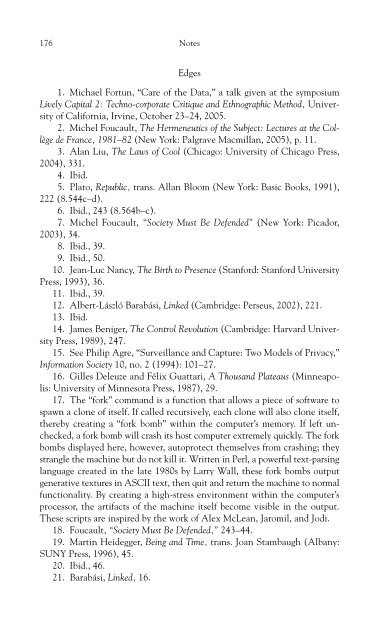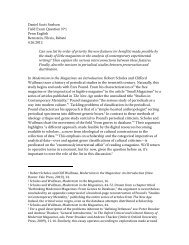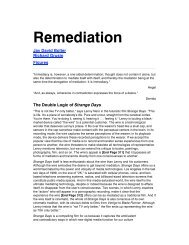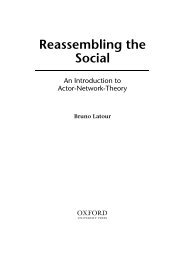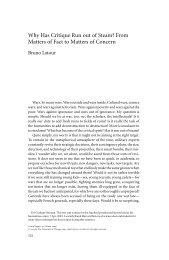The Exploit: A Theory of Networks - asounder
The Exploit: A Theory of Networks - asounder
The Exploit: A Theory of Networks - asounder
Create successful ePaper yourself
Turn your PDF publications into a flip-book with our unique Google optimized e-Paper software.
176 Notes<br />
Edges<br />
1. Michael Fortun, “Care <strong>of</strong> the Data,” a talk given at the symposium<br />
Lively Capital 2: Techno - corporate Critique and Ethnographic Method, University<br />
<strong>of</strong> California, Irvine, October 23– 24, 2005.<br />
2. Michel Foucault, <strong>The</strong> Hermeneutics <strong>of</strong> the Subject: Lectures at the Collège<br />
de France, 1981– 82 (New York: Palgrave Macmillan, 2005), p. 11.<br />
3. Alan Liu, <strong>The</strong> Laws <strong>of</strong> Cool (Chicago: University <strong>of</strong> Chicago Press,<br />
2004), 331.<br />
4. Ibid.<br />
5. Plato, Republic, trans. Allan Bloom (New York: Basic Books, 1991),<br />
222 (8.544c– d).<br />
6. Ibid., 243 (8.564b– c).<br />
7. Michel Foucault, “Society Must Be Defended” (New York: Picador,<br />
2003), 34.<br />
8. Ibid., 39.<br />
9. Ibid., 50.<br />
10. Jean - Luc Nancy, <strong>The</strong> Birth to Presence (Stanford: Stanford University<br />
Press, 1993), 36.<br />
11. Ibid., 39.<br />
12. Albert - László Barabási, Linked (Cambridge: Perseus, 2002), 221.<br />
13. Ibid.<br />
14. James Beniger, <strong>The</strong> Control Revolution (Cambridge: Harvard University<br />
Press, 1989), 247.<br />
15. See Philip Agre, “Surveillance and Capture: Two Models <strong>of</strong> Privacy,”<br />
Information Society 10, no. 2 (1994): 101– 27.<br />
16. Gilles Deleuze and Félix Guattari, A Thousand Plateaus (Minneapolis:<br />
University <strong>of</strong> Minnesota Press, 1987), 29.<br />
17. <strong>The</strong> “fork” command is a function that allows a piece <strong>of</strong> s<strong>of</strong>tware to<br />
spawn a clone <strong>of</strong> itself. If called recursively, each clone will also clone itself,<br />
thereby creating a “fork bomb” within the computer’s memory. If left un -<br />
checked, a fork bomb will crash its host computer extremely quickly. <strong>The</strong> fork<br />
bombs displayed here, however, autoprotect themselves from crashing; they<br />
strangle the machine but do not kill it. Written in Perl, a powerful text - parsing<br />
language created in the late 1980s by Larry Wall, these fork bombs output<br />
generative textures in ASCII text, then quit and return the machine to normal<br />
functionality. By creating a high - stress environment within the computer’s<br />
processor, the artifacts <strong>of</strong> the machine itself become visible in the output.<br />
<strong>The</strong>se scripts are inspired by the work <strong>of</strong> Alex McLean, Jaromil, and Jodi.<br />
18. Foucault, “Society Must Be Defended,” 243– 44.<br />
19. Martin Heidegger, Being and Time, trans. Joan Stambaugh (Albany:<br />
SUNY Press, 1996), 45.<br />
20. Ibid., 46.<br />
21. Barabási, Linked, 16.


